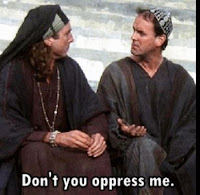Part 1 of this article looked back at some famous historical conflicts staged in the name of equality, and the documents celebrated as icons of humanity's moral progress toward a more egalitarian society. It pointed out that those famous conflicts were less about a belief in equality and more about resenting and rebelling against oppression.
Part 2 then explored the history of society to see whether inequality is an inherent 'natural' feature of human beings, finding instead that inequality was a trade-off for the more efficient resource production of agrarian society. Western* society developed from an egalitarian society through agriculture and an industrialised society that was increasingly hierarchical, with an unfortunate dearth of social controls over the behaviour leaders, other than outright revolt. In sum, appeals to 'nature' do not in any way support an argument for denying people equal rights before the law.
However, one group of people find this all very distasteful.
This third and final part of the Equal series explores the growing influence of this group, the alarming future they represent and discusses what can be done about it.














